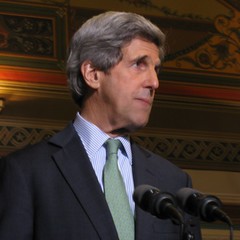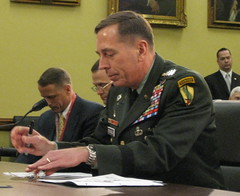Friday
Oct302009
Most Pakistanis Don’t Know What Al-Qaida Is, Says Survey
Travis Martinez, University of New Mexico/Talk Radio News Service
The average Pakistani citizen has little to almost no understanding of the al-Qaida network or the Afghan Taliban organization, according to Georgetown University School of Foreign Service Professor Christine Fair.
“Many Pakistanis don’t know what al-Qaida is...Sure enough we went around a room and asked if people knew al-Qaida: Few knew,” said Fair of a survey she conducted in Pakistan earlier this year.
According to Fair, one woman that openly responded to the survey correlated the Taliban and al-Qaida with Afghan President Hamid Karzai.
The average Pakistani citizen has little to almost no understanding of the al-Qaida network or the Afghan Taliban organization, according to Georgetown University School of Foreign Service Professor Christine Fair.
“Many Pakistanis don’t know what al-Qaida is...Sure enough we went around a room and asked if people knew al-Qaida: Few knew,” said Fair of a survey she conducted in Pakistan earlier this year.
According to Fair, one woman that openly responded to the survey correlated the Taliban and al-Qaida with Afghan President Hamid Karzai.




 Friday, October 30, 2009 at 5:26PM
Friday, October 30, 2009 at 5:26PM

Before Senate, McChrystal Cautiously Confident On Afghanistan
U.S. Army General Stanley McChrystal said Tuesday that the mission in Afghanistan is difficult, and that success will require steadfast commitment and may come at a significant cost.
Gen. McChrystal, Commander of the NATO Internation Security Assistance Force, and U.S. Ambassador to Afghanistan Karl Eikenberry testified before the Senate Armed Services Committee on Afghanistan on ways to protect the country from threats, such as al-Qaeda.
“To pursue our core goal of defeating al-Qaeda and preventing their return to Afghanistan, we must disrupt and degrade the Taliban’s capacity, deny their access to the Afghan population and strengthen the Afghan Security forces,” McChrystal said.
"Rolling back the Taliban is a pre-requisite to the ultimate defeat of al-Qaeda,” the General added.
However, McChrystal cited a bevy of reasons for optimism.
“My confidence derives first from the Afghans' resolve, since it is their actions that will ultimately matter most in ending this conflict, with their interests secured...Second, we do not confront a popular insurgency...Third, where our strategy is applied we’ve begun to show that we can help the Afghans establish more effective security and more credible governance. Finally, Afghans do not regard us as occupiers,” he said.
McChrystal also said that the American military faces many challenges in Afghanistan, but asserted that "our efforts are sustained by one unassailable reality: neither the Afghan people nor the international community want Afghanistan to remain a sanctuary for terror and violence.”
Before the committee hearing began, protesters expressed their opposition to the war, holding up signs that read, “Surge Big Mistake,” and “Jobs Not Bombs."